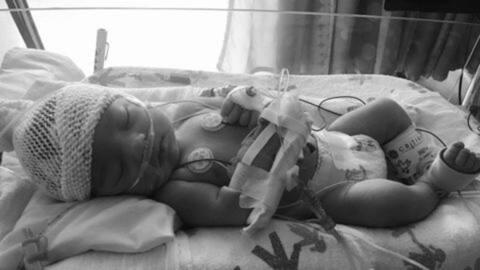#SaveLydia: This 6-month-old suffering from genetic mutation needs help
What's the story
Six-month-old Lydia Seth was born with a rare genetic disorder. Born on December 22, 2018, Lydia was diagnosed with a mutation of the gene KCNQ2, which affects a cell's ability to generate and transmit electrical signals. As a result, Lydia will be severely mentally and physically disabled- she will never be able to sit-up, crawl, walk or talk. But, there's a ray of hope.
Details
Only two other such cases known
Although genetic mutations are quite common and not 'rare', per se, Lydia's mutation involves a single point mutation- an Adenine base is mistyped as Guanine- at position 683 of the KCNQ2 gene, which plays a key role in transmitting electric signals between neurons in the brain. Apparently, there are only two other such cases known: one in Greece and one in England.
Information
After birth, Lydia started getting seizures
Commonly, the mutation leads to benign familial neonatal seizures (BFNS), as was with Lydia's case. She started having seizures soon after birth. Initially, doctors believed she would get better, but a genetic test, fortunately, got her an early diagnosis.
Treatment
There's a technology that can help Lydia
Apparently, there's a technology called Antisense Oligonucleotide (ASO), which can help silence the mutation at its source. To simplify, the DNA plays a key role in biological functions by creating another single-strand nucleic acid, RNA, in a process called 'transcription'. The RNA then later helps form proteins through 'translation'. While many treatment process target the proteins formed from the mutated DNA, ASOs target RNA.
Open-sourcing
However, Lydia's treatment can help others like her
However, ASOs need to be customized for each patient, a process that could take months. Hence, each time someone requires ASO treatment, they would wait months for the urgent care of a patient's need. This is why Lydia's parents chose to open-source their daughter's treatment, to serve as a template for the treatment of others like her, called 'Lydian Accelerator'.
Twitter Post
Read her father's Twitter thread here
1/My 6mo daughter, Lydia, was born with a random genetic mutation. She will never sit, crawl, walk or talk. She lives in pain. We were told nothing could be done for her. That’s not true. We can fix Lydia and others like her *today*. Here’s how… pic.twitter.com/zVzq6Z3vIU
— Rohan Seth (@rohanseth) July 24, 2019
Donation
Here's how you can help with the process
Lydia's parents, Rohan Seth and Jen Fernquist Seth, who grew up in India and Canada respectively, explained in an online blog that RNA has "repeatable properties, making customization remarkably easy" which could help design ASOs. However, to be able to treat Lydia and further use the treatment, they need funding. If you're willing to donate, you can contribute to 'Save Lydia' fundraiser (https://bit.ly/2Zg7Wke).
